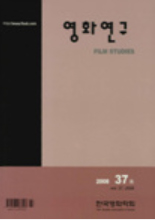- 영문명
- A Study on the Political Unconscious of Korean Film Critique: From Late 50's to 70's
- 발행기관
- 한국영화학회
- 저자명
- 문재철
- 간행물 정보
- 『영화연구』제37호, 113~141쪽, 전체 29쪽
- 주제분류
- 예술체육 > 예술일반
- 파일형태
- 발행일자
- 2008.09.30

국문 초록
영문 초록
Achieving the modernity was a long time ardent wish for the Korean cinema. Due to the background of Japanese colonial period and the Korean war, it was difficult for Korean film to establish a systematical condition as Hollywood or attaining aesthetic achievement as European cinema. Since Korean film didn't have reasonable industrial system nor aesthetic achievement, it was logical to be situated as the other's position, and for that reason, it was natural to crave for new films with modernity and new system. Although it was initiated by the nation, the late 1950s to 1970s was a period of industrialization in Korea, which also functioned as a sort of ideology. Film also couldn't be independently free from this mood in a sense of social, cultural, political ways that it resulted in a form of film promotion policy. There were new film policies adapted so called, the 'Well-made film compensation program', 'Screenquota system' etc, and these were all one of the Korean film industrialization policy, which was bench-marked from the Hollywood system. But policies with protection and fostering layed many side effects and became the core reason of downward of Korean film in the late 70s. In summary, the Korean film industry in this period shows the typical contradictions of developing countries when fast shifting to modernization society. However, it is difficult to define that these logic of modernization is forced only by the nation. The hope of modernization in film was also an internal desire from the community and it wasn't only limited to the film industry. Film criticism were unconsciously also seeking for this kind of ideology with an aim of achieving the modernity, and these symptoms were seen in many aspects. Criticism, which in a way anti to modernization ideology were mostly contradicted and disintegrated. One of the expample is the idealism tendency, which was the biggest distinctive feature of Korean film criticism in this period. In a lacking condition of industry, it was necessary to emphasize an earnest auteurism by the director to acknowledge as a good film. The reason why the European art films (especially Neorealism) were more attracted than Hollywood films or such types of films that had more audience tendency, has been originated by these emphasis on auteurism and not by the materialism. Anyhow, this idealism was sort of a symptom. Basically, it was emphasizing the art itself but on the other aspect, it was also regarded as a way of break out for Korean films from the backwardness and moving toward the center. In other words, it was a critical decision that overcoming the other's position and achieving the modernity in Korean films were believed possible by the spiritual aspects rather than the materials. The Korean realism and art film theories in this period could be appreciated in the same context. This is also similar to the attitude on the technology. Valuing the contents rather than technic part was another distinctive feature for Korean film criticism, and so the Hollywood technic were less regarded. But the critics praised and valued a great amount of it in a matter of Korean films' technical achievement, and this was quite a contradictory attitude. This kind of dualism, which has also derived from the other' position to the Hollywood films, can also be regarded as showing the hidden desire of modernization. In conclusion, the unconscious desire that defined the Korean cinema criticism in this period was the modernization of Korean films. Although in the surface, this kind of desire was shown to be critical to the industrialization's contradictions, unconsciously it was colluded together. Therefore the desire of the Korean cinema criticism was linked with the social and cultural dimensions.
목차
1. 시작하며
2. 비평의 정신주의와 영화의 대중성에 대한 태도
3. 장르 구별짓기
4. 모방과 표절의 문제
5. 문예영화의 경우
6. 테크놀로지에 대한 태도
7. 마치며
해당간행물 수록 논문
참고문헌
최근 이용한 논문
교보eBook 첫 방문을 환영 합니다!

신규가입 혜택 지급이 완료 되었습니다.
바로 사용 가능한 교보e캐시 1,000원 (유효기간 7일)
지금 바로 교보eBook의 다양한 콘텐츠를 이용해 보세요!



